

A Year In Review : L'année 2013 vue par Facebook. Graph Search - coming to a Facebook near you. If your Facebook language is set to US English, you might find that your account has added a new feature from today.
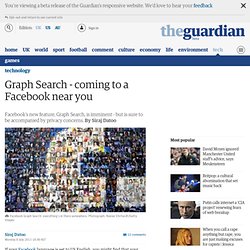
Facebook is rolling out Graph Search, a new search tool that will allow users to quickly find out information from across the site. Essentially, it's an attempt to keep hold of an active user base by keeping them on the site for longer. In some ways, Graph Search is simply a natural extension to the News Feed. In the book about her experiences while at Facebook, The Boy Kings, Katherine Losse writes: "The general concept of News Feed was simple: An algorithm was now surfacing content that it believed, based on your activity on the site (what you looked at), you would find interesting.
" Now, instead of having to follow a social graph containing your friends' activities, Graph Search opens up your information even further. Facebook would argue that they are making it easier to find useful information that's relevant to you. We listed some of these problems in January: Facebook : comment Graph Search va affecter votre profil. Facebook : testez le Graph Search. Le Graph Search de Facebook n'est pas encore disponible en France, mais vous pouvez d'ores et déjà le tester en changeant la langue utilisée, dans les options.
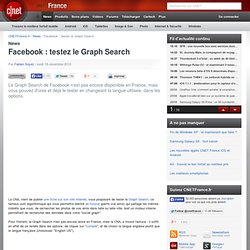
La CNIL vient de publier une fiche sur son site internet, vous proposant de tester le Graph Search, ce fameux outil algorithmique qui vous permettra bientôt de trouver (parmi vos amis) qui partage les mêmes intérêts que vous, de rechercher les photos de vos amis dans telle ou telle ville, bref un moteur interne permettant de rechercher des données dans votre "social graph". Pour l'instant, le Graph Search n'est pas encore lancé en France, mais la CNIL a trouvé l'astuce : il suffit en effet de se rendre dans les options, de cliquer sur "compte", et de choisir la langue anglaise plutôt que la langue française (choisissez "English US").
Recherche dans le graphe Facebook. Pourquoi Facebook offre 3 milliards de dollars pour Snapchat. Mark Zuckerberg serait-il paranoïaque, en privé comme dans son job de patron de Facebook ?
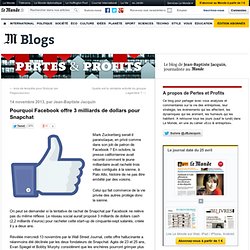
En octobre, la presse californienne avait raconté comment le jeune milliardaire avait racheté trois villas contiguës à la sienne, à Palo Alto, histoire de ne pas être embêté par des voisins. Celui qui fait commerce de la vie privée des autres protège donc la sienne. Tumblr. Tumblr (stylized in its logo as tumblr.) is a microblogging platform and social networking website founded by David Karp and owned by Yahoo!
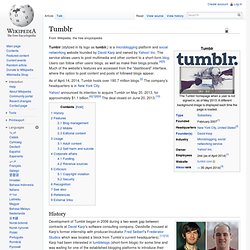
Inc. The service allows users to post multimedia and other content to a short-form blog. Users can follow other users' blogs, as well as make their blogs private.[4][5] Much of the website's features are accessed from the "dashboard" interface, where the option to post content and posts of followed blogs appear. As of April 14, 2014, Tumblr hosts over 180.7 million blogs.[2] The company's headquarters is in New York City. Yahoo! LinkedIn. LinkedIn /ˌlɪŋkt.ˈɪn/ is a business-oriented social networking service.
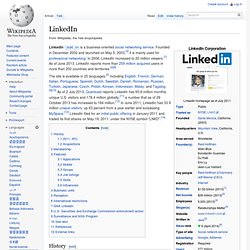
Founded in December 2002 and launched on May 5, 2003,[3] it is mainly used for professional networking. In 2006, LinkedIn increased to 20 million viewers.[7] As of June 2013[update], LinkedIn reports more than 259 million acquired users in more than 200 countries and territories.[2][8] History[edit] LinkedIn's CEO is Jeff Weiner,[2] previously a Yahoo! Inc. executive. Twitter.
History Creation and initial reaction Twitter's origins lie in a "daylong brainstorming session" held by board members of the podcasting company Odeo.
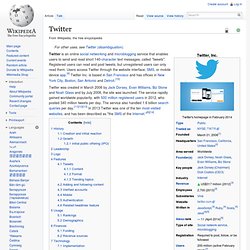
Dorsey, then an undergraduate student at New York University, introduced the idea of an individual using an SMS service to communicate with a small group.[15][16] The original project code name for the service was twttr, an idea that Williams later ascribed to Noah Glass,[17] inspired by Flickr and the five-character length of American SMS short codes. The developers initially considered "10958" as a short code, but later changed it to "40404" for "ease of use and memorability. ...we came across the word 'twitter', and it was just perfect.
Myspace. Myspace (stylized as myspace, previously stylized as MySpace)[5] is a social networking service with a strong music emphasis owned by Specific Media LLC and pop music singer and actor Justin Timberlake.[6] Myspace was launched in August 2003 and is headquartered in Beverly Hills, California.[7][8] In April 2014, Myspace had 1 million unique U.S. visitors.[9] Myspace had a significant influence on pop culture and music[17] and created a gaming platform that launched the successes of Zynga and RockYou, among others.[18] The site also started the trend of creating unique URLs for companies and artists.[19]
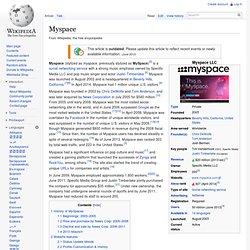
Instagram. History Instagram began development in San Francisco when Kevin Systrom and Brazilian Michel "Mike" Krieger chose to focus their multi-featured HTML5 check-in project Burbn on mobile photography.[19][20] The name "Instagram" is a portmanteau of "instant camera" and "telegram".[21] On March 5, 2010, Systrom closed a $500,000 seed funding round from Baseline Ventures and Andreessen Horowitz while working on Burbn.[22] Josh Riedel joined the company as Community Manager.[23] Shayne Sweeney joined in November 2010 as an engineer and Jessica Zollman was hired as a Community Evangelist in August 2011.[24][25] On February 2, 2011, it was announced that Instagram had raised $7 million in Series A funding from a variety of investors, including Benchmark Capital, Jack Dorsey, Chris Sacca (through Capital fund), and Adam D'Angelo.[29] The deal valued Instagram at around $25 million.[30] On October 3, 2013, Instagram announced that it would be adding advertising to its platform.[64] Popularity.
Google. Google is an American multinational corporation specializing in Internet-related services and products.
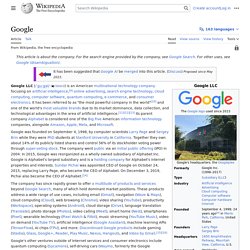
These include online advertising technologies, search, cloud computing, and software.[8] Most of its profits are derived from AdWords,[9][10] an online advertising service that places advertising near the list of search results. Google was founded by Larry Page and Sergey Brin while they were Ph.D. students at Stanford University. Together they own about 14 percent of its shares but control 56 percent of the stockholder voting power through supervoting stock. They incorporated Google as a privately held company on September 4, 1998.
An initial public offering followed on August 19, 2004. Take This Lollipop. Technology. Facebook Is Expected to Introduce Its Phone. A New Tool Aims to Help Facebook Users Dig Deep. Facebook timeline: the social network's life story. Has Facebook at last found a way to make money? - Business News - Business. The post-mortem made for an embarrassing 2012 for a business that had enjoyed an astonishing rise, emerging from a university dorm room to become a technology behemoth in less than a decade, reigning over the social web from a base in Menlo Park, near San Francisco.

Only this week, more than a year after the the stock floated and then promptly disappeared under water, did the price rise back to $38, the level at which it was initially sold to investors. The reason: Facebook's success at harnessing our growing fondness for mobile devices to generate advertising revenues. Last year, in its second-quarter earnings release, the company didn't even bother to mention how much it made from mobile advertising, so nascent were its efforts in the new market. The update helped cement a change in sentiment towards the company. Soon, however, things got worse: the focus shifted from the too-high offer price to mobile revenues, which were too low.